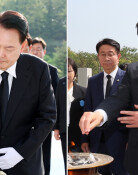For KORUS FTA, Trump wants justification not figures
For KORUS FTA, Trump wants justification not figures
Posted September. 30, 2017 07:38,
Updated September. 30, 2017 07:45
The threat from the U.S. President Donald Trump on Sept. 2 to end the free trade deal with South Korea was not just a bluff and turned out to be real preparation in progress by the U.S. government as leverage on the trade fronts. Citing a White House official, South Korea’s Trade Minister Kim Hyun-jong said on Wednesday (local time) in a meeting with correspondents in Washington that the United States even wrote a notification letter of termination of the FTA to South Korea. U.S. Commerce Secretary Wilbur Ross also said on Sept. 22 in a seminar that the president does not like “South Korea’s policy approach to provide humanitarian aids to Pyongyang” and South Korea’s such consideration is making an impact on the president who wants to scrap the trade deal with South Korea. After the first session of joint South Korea-U.S. FTA commission was cancelled in August amid conflicts about policy on North Korea, Trump seems to be pushing forward with termination of the FTA.
With the U.S. public’s consensus that the alliance between South Korea and the United States is imperative to deal with North Korea’s nuclear ambition, the FTA issue has been put behind in Washington for some time being, but its termination seems real and imminent. The reason why the South Korean government has recently suggested the second joint FTA commission session be held on Wednesday in Washington is that Seoul may have sensed some rapid developments going on in Washington. Kim’s remarks that South Korea must “begin renegotiation with the United States immediately before it discusses termination of the deal” are interpreted in a way that makes South Korea not be able to maintain a strong position in negotiation anymore.
In this context, South Korea’s current push requesting a joint survey of FTA benefits will lose the momentum, and the U.S.’s demand for immediate negotiation on revision of the deal will probably carry more weight. Washington will try to pressure Seoul to resolve its trade deficit in the automotive industry and open the service industry. With the manufacturing industry’s competitiveness level staying flat and the service industry lagging behind, South Korea cannot opt to open more markets, but keeping the deal as it is also seems difficult. South Korea may find itself in a dilemma.
Trump’s demand for renegotiation of the FTA is mostly attributable to his interests in his political platform such as white, middle-class American workers in the Rust Belt states of Michigan, Ohio, Indiana, and Illinois, feeding on outdated manufacturing plants. Trump does not care much about trade volume between the two countries or improving service balance. He wants justification to appease his supporters, not logical statistic data or figures. Kim and his team should be aware of Trump’s intention before starting renegotiation with their counterparts in Washington.







